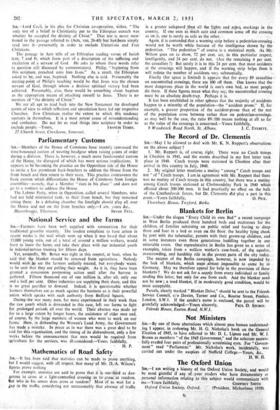National Service and the Farms
Sta.—Farmers have been well supplied with ammunition for their traditional grumble recently. The loudest complaint to have arisen in recent weeks is the wail which went up when It was heard that about 15,000 young men, out of a total of around a million workers, would have to leave the farms and take their place with our industrial youth in national:service training for fifteen days.
Yet, assuredly, Mr. Bevan was right in this respect, at least, when he said that the blanket should be removed from agriculture. Nobody would wish Jo see the farmers unfairly treated, but everybody wants to be sure that they are pulling their weight. As it is, they have been granted'. a concession postponing action until after the harvest is gathered. Fifteen thousand out of one million is, after all, only one and a half per cent. Other industries are supplying their share, and this is no great sacrifice to demand. Indeed, it is questionable whether farmers themselves are as much against the business as is their powerful union which speaks with such authority from Bedford Square, During•the war many men, far more experienced in their work than the raw youth which is demanded in this case, left our farms to fight for prolonged periods all over the world. Their absence was made up for to a large extent by longer hours, the assistance of older men' and, of course, by the large numbers of women who went to work on our farm% Here, in disbanding the Women's Land Army, the Government has made a mistake. In peace as in war there was a great deal to be said for this organisation, and the timing of its disbandment, only a few weeks before the announcement that men would be required from tgriculture for the services, was ill-considered.—Yours faithfully, H. P.


































 Previous page
Previous page